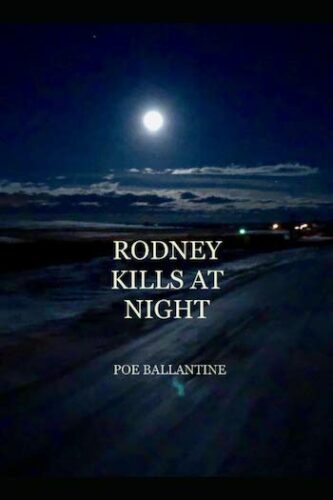Book Review: “Rodney Kills at Night” — Engaging Company
By Vincent Czyz
Poe Ballantine is often compared to Charles Bukowski and Jack Kerouac. I’d say he’s closer to the former than the latter, but he’s more polished than either and funnier than both put together.
Rodney Kills at Night by Poe Ballantine. Independently published, 205 pages, $9.99.
“Fate can be described as a circle, but then again, so can a CHEESEBURGER …” [all caps his]
—Rodney Kills at Night

Poe Ballantine? Is that a real name? (No.) Where’s he from anyway? Born in Denver, he grew up in San Diego, and after years of drifting across the US, staying weeks to months in one town or city or another, he settled in Chadron, Nebraska. “Nebraska? Are you kidding me?” he writes in his memoir/noir mashup, Love & Terror on the Howling Plains of Nowhere. “Most people would live in an outhouse in Bangladesh before they would voluntarily move to Nebraska.” (If the mystery of how he ended up in Chadron is too much for you, pick up the book; it’s worthwhile reading and, as a bonus, the audio version is narrated by Ballantine.) If he’s so good, why haven’t I ever heard of him? A lot of superb authors, more than ever before I’d wager, go unrecognized by the literary-industrial complex and populate the margins — i.e., the small presses and lesser-known literary magazines — with their work.
Ballantine’s published some 13 books (Goodreads puts the number at 20, but there’s some double counting), including six essay collections, six novels, and a short story collection. I’ve read four, two of them twice. My first book-length encounter of the Ballantine kind was with 501 Minutes to Christ. The eponymous essay was included in Best American Essays 2006 and clearly belonged there. So did several of the other essays; it be must an oversight on someone’s part that they’re not. Since Ballantine has a penchant for writing about his adventures and mishaps on the road, eccentric characters (many of whom he’s actually met), far-flung towns Ballantine imagines Rod Serling describing, struggles with addiction (“Methamphetamine for Dummies” in 501 Minutes may be his finest hour in nonfiction), he’s often compared to Bukowski and Kerouac. I’d say he’s closer to the former than the latter, but he’s more polished than either and funnier than both put together.
Rodney Kills at Night, published in November of last year, traces an unlikely trajectory that joins Las Vegas and the Pine Ridge Reservation in South Dakota (Chadron, Ballantine notes on the back cover, is 26 miles from Pine Ridge). Despite the ominous-sounding title, the novel doesn’t recount the gruesome exploits of a Hannibal Lecter knockoff. The last three words are simply an Anglicized surname (think Kevin Dances With Wolves). While it’s true Rodney is an adept hunter, not necessarily nocturnal, the name comes to be something of a double entendre (you’ll see).
Another of Ballantine’s oddball outcasts, Rodney lives on the rez in a trailer home that “leaned like a cardboard box in the rain and was surrounded by five stripped Pontiacs, hoods up in surrender.” Pine Ridge, as you may have surmised, is not on any magazine’s list of Most Desirable Places to Live, particularly not in the early 1980s, when the novel takes place. The Sioux generally inhabit lopsided shacks or dilapidated mobile homes like Rodney’s and rarely have the luxury of indoor plumbing or electricity.
Rodney, however, doesn’t just want off the rez; he fantasizes about becoming a stand-up comedian. The barriers are manifold, not least among them the fact that “there were more ducks on the moon than Indian comics.” In fact, “There were no Indian anything except revolutionaries, sidekicks, powwow dancers, and Buffy Saint-Marie.” And then there’s white bias, which the narrator sums up this way: Rodney “was an Indian, you see, unreliable, shiftless, sinister, probably drunk. His people were arrogant, volatile, belligerent, stubborn.”
Rodney’s fifth “stepfather,” Kimo, is a “a mixed-blood sellout” who, as an underling of infamous tribal chairman Dick Wilson, had “made a lot of money terrorizing innocent people and stealing government funds.” (For more about Wilson, his goons, and the evils of life on the Sioux reservations, get hold of Lakota Woman, an eye-opening memoir by Mary Brave Bird). Rodney punches out Kimo during an argument, accidentally killing him, but decides against turning himself in: “The government was content with Indians killing each other or Indians dying by their own hand … but kill one of theirs, a toka [mixed-blood] loudmouth and a friend of Dick Wilson … and it was like dialing up the Federal Bureau of Investigation yourself.”
Seizing his chance to put the rez in his rear-view, Rodney thumbs his way to Las Vegas, mugs drunken gamblers to pay his bills, takes his shot at stand-up comedy with a bunch of other amateurs, tanks miserably, gets beaten to a pulp by a gang of Mexicans whose turf he encroached on, and is taken in by Orianna, a biracial transplant from Wales. Once a singer, Ori was caught in the disastrous 1980 MGM fire and so badly burned that she’s become an invalid. She has a great heart, however, and she and Rodney connect on a level that, depending on the metaphysical school you belong to, might be called spiritual, platonic, or plain old human.
Rodney goes on gathering material for his act and showing up on amateur night until he develops something of a following. Still fearful he’ll be nabbed by the cops, he makes a habit of altering his appearance, eventually cutting his hair and dying it blond while performing under one assumed name after another. Sure enough, just when he’s hitting the big time—a TV spot no less—his past catches up with him, and he’s suddenly the most wanted man in Vegas.

Writer Poe Ballantine. Photo: Dave Jannetta
There’s a lot to admire in this novel, including the way Ballantine handles issues facing the Sioux without resorting to self-righteous whining or a screed marinated in political correctness. Instead, Rodney works his grievances into his stand-up routine, blunting them with humor.
I admit I was somewhat put off by his interim career choice (rolling drunks) and the way Rodney soothes his complaining conscience (“It’s not stealing if your survival depends upon it.”), but he doesn’t lose too much sympathy as a character, partly because the Mexican gang administers a beat-down worthy of any inner city, but also because there’s something else going on. Throughout the novel Rodney is scrupulous about refusing handouts — even a free meal when he’s famished — a commentary on Lakota (Sioux) mentality: they are, as Ballantine reminds us, a warrior people, and stalking drunks might indeed seem more honorable to them than a fast-food windfall.
Midnight muggings aside, I enjoyed this novel for its quirkiness. For its accurate portrayal of the Lakota (don’t take my word for it; Ballantine got the imprimatur of people like Lee the Bullrider). I enjoyed it for its humor, present both in Rodney’s act and his daily interactions. For its unsentimental take on Ori’s personal disaster, the ruin the reservation system has made of the Lakota and Rodney, on life in general. Moreover, the characters are engaging company, and in the end, while the novel’s plot moves along at a good clip, this is a character-driven book. Finally, I enjoyed the writing, which is polished, concise, and quietly lyrical.
Does Rodney eventually give those flatfoots the slip? Does it matter? As Mr. Kills at Night reminds us, “a happy ending is just a story cut short.”
Vincent Czyz is the author of Adrift in a Vanishing City, a collection of short fiction that was awarded the Eric Hoffer Award for Best in Small Press; The Christos Mosaic, a novel; and The Three Veils of Ibn Oraybi, a novella. He is the recipient of two fellowships from the NJ Council on the Arts, the W. Faulkner-W. Wisdom Prize for Short Fiction, and the Truman Capote Fellowship at Rutgers University. His work has appeared in many publications, including New England Review, Shenandoah, AGNI, Massachusetts Review, Georgetown Review, Tin House, Tampa Review, Boston Review, and Copper Nickel.


I’m glad you recommended him to me a while ago. 501 Minutes to Christ was absorbing and I loved his voice — abstract but rawly personal connections and yet he’s rooted in the rough-and-tumble of real day to day living on the margins. And you’re right on with where the comparisons with Kerouac and Buk meet and don’t meet. I have “…Nowhere…” on the shelf as well but I haven’t gotten a chance to look at it yet. This one sounds interesting too. He definitely seems like an underrated writer, who might be too quirky and unclassifiable to sell to big name publishers. That’s what we’re here for, to give a worthy if eccentric writer like him a little bit of a boost…
It’s always encouraging to hear that a book recommendation worked out. And, yes, Ballantine is definitely underrated despite having gotten into The Atlantic a couple of times. Nowhere is good in interesting ways, part murder mystery, part memoir, part profile of a town. I got the audio version & listened to it twice. You’re also spot-on about our mission: bring those dark horses into the light.
Vincent,
This is a wonderful book review about an unknown author to me. I will definitely buy this book thanks to you.
Mark
Hi, Mark,
Thanks so much for you kind words. I hope you enjoy it! I certainly did. I would also urge you to pick up 501 Minutes to Christ. Really superb (and funny) personal essays.
Vince